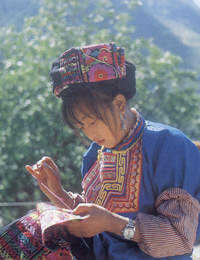 The Qiang ethnic minority mostly inhabits hilly to mountainous areas of the Maowen County in the Aba-Tibetan Qiang Autonomous Prefecture in western Sichuan Province. It has a population of 198,252 (by 1990); a small number lives with the Tibetan, Han and Hui ethnic groups in Ganzi Tibetan Autonomous Prefecture.
The Qiang ethnic minority mostly inhabits hilly to mountainous areas of the Maowen County in the Aba-Tibetan Qiang Autonomous Prefecture in western Sichuan Province. It has a population of 198,252 (by 1990); a small number lives with the Tibetan, Han and Hui ethnic groups in Ganzi Tibetan Autonomous Prefecture.
The language of the Qiang people consists of a northern and southern dialect. The dialects used by the Qiangs who belong to the Qiang branch of the Tibeto-Burman Austronesian of the Chinese-Tibetan Phylum. Due to their close contact with the Han people, many Qiangs speak Chinese. The Qiangs have no written scripts and the Chinese characters are in common use.
The Qiang people call themselves Erma, meaning aboriginals. Some inscriptions on tortoise shells, dating back 3,000 years ago, show that the ancestors of the Qiang people were already very active in the northwest and central plains of China during the Shang Dynasty (16-11BC). During the western Han Dynasty (206BC-220AD), an administrative prefecture was established in the Hexi Corridor, and some Qiangs lived in this area then gradually moved into the inland provinces, living together with the Han people. During 600 to 900AD when the Tibetan Regime gradually expanded its rule over the region, some Qiangs were assimilated by the Tibetans and others by the Hans. A small Qiang population remained indigenous which developed into the distinctive ethnic minority of today.
The Qiangs are mainly engaged in agriculture which is complemented with stockbreeding, hunting and other economic activities such as paper-making, timber-processing and leather-manufacturing, etc. The Qiang people have created a unique culture, and the deft Qiang women are expert in embroidery and crafts.
Most Qiangs are believers of Animism, except that those who lived near the Tibetan communities are followers of Lamaism. They also worship their ancestors.
October 1 of the lunar calendar is the New Year of the Qiang people. Suspend a Dog to Sacrifice Mountains is a traditional festival of the Qiang people, which is held in January on every lunar agenda and lasts seven days.
In addition, the Qiangs occupy a fertile land of mild climate and adequate rain. Deep in the forests are such rare animals as giant pandas, golden monkeys and flying foxes, etc.
